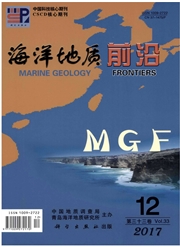

 中文摘要:
中文摘要:
以层序地层学为理论指导,通过对地震、钻井、测井及古生物等资料的研究,建立了北黄海盆地东部坳陷东南部的层序格架。研究区的中生界可分为1个一级层序、2个二级层序、5个三级层序,在此层序格架内进行了沉积相划分及沉积体系研究,厘定了扇三角洲、辫状河三角洲、浊积扇和湖泊沉积等4种沉积体系。断陷早期,JSQ1的西部与东部分别发育了中型的扇三角洲与辫状河三角洲沉积体系;断陷中期,西部的扇三角洲沉积体系逐步扩展并在其前端多发育小型浊积扇,东部的辫状河三角洲沉积体系亦持续扩张且在JSQ4沉积期规模达到最大;断陷晚期,KSQ1内仅发育盆缘的小型扇体和滨浅湖相沉积,东部、南部隆起区未接受沉积或沉积较薄并剥蚀殆尽。沉积体系的平面展布和纵向演化受古构造与古地貌的控制。
 英文摘要:
英文摘要:
The sequence stratigraphy framework of the southeast of the Eastern Depression of the North Yellow Sea Basin was established 'oy comprehensively study of drilling, well logging and seis- mic data in this paper. The Mesozoic of the study area can be subdivided into five third-order, two second-order and one first-order sequences. The spatial distribution of sedimentary facies and deposi- tional systems indicates that four major depositional systems, say a fan delta, a braided river delta, a turbidite fan and a lacustrine system, occur in this region. During the early stage of faulting, there were a medium-sized fan delta and a braided river delta depositional system occurred in the west and east of JSQ1 respectively. During the middle stage of faulting, the fan delta system in the west ex- panded step by step and in the front of the system formed small turbidite fans. The braided river delta system in the east also prograded continuously and reached its maximum at the depositional period of JSQ4. During the late stage of faulting, only small basin-marginal fan bodies and nearshore-shallow lake facies developed in the sequence of KSQ1. The eastern and southern uplift received none or very thin sediments during the periods and dominated by erosion. The vertical evolution and spatial distri- bution of the depositional systems were controlled by paleotectonics and paleogeomorphology.
 同期刊论文项目
同期刊论文项目
 同项目期刊论文
同项目期刊论文
 期刊信息
期刊信息
